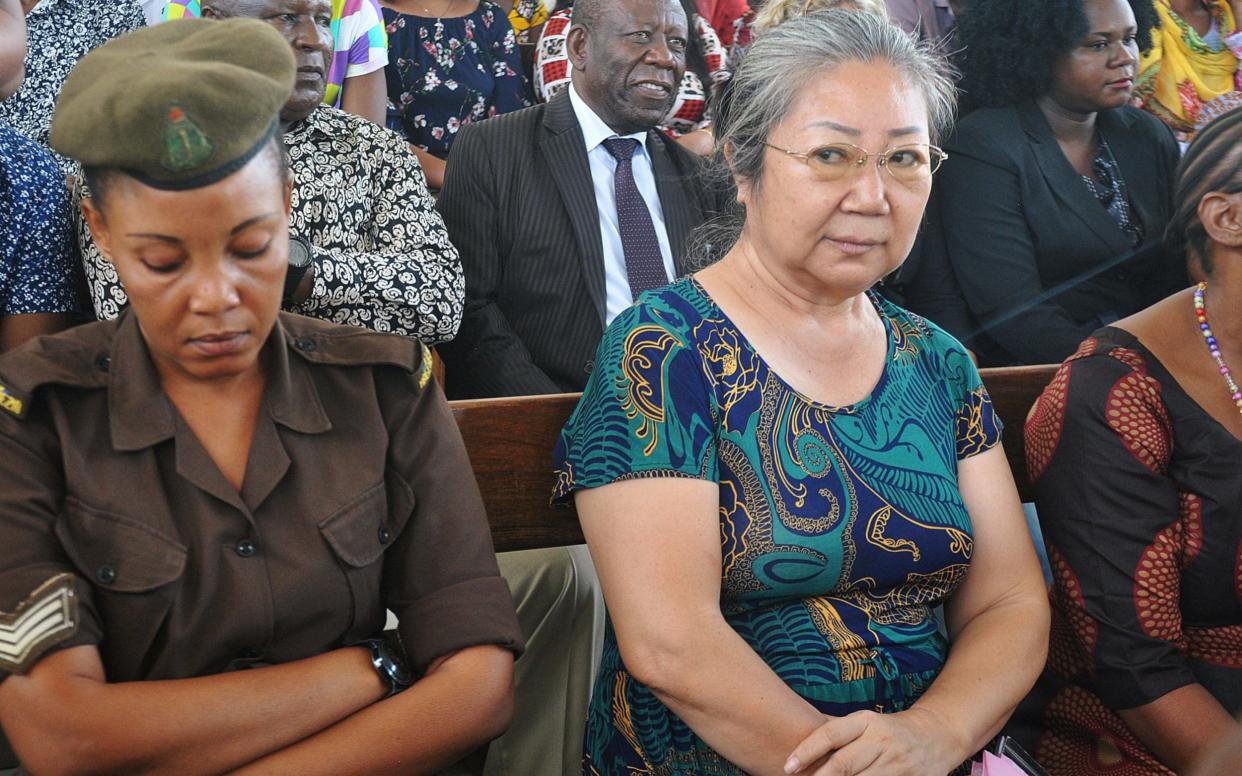Chinese 'Ivory Queen' who smuggled tusks of more than 350 elephants jailed for 15 years

A court in Tanzania convicted a notorious Chinese trafficker known as “the Ivory Queen” on Tuesday, dealing a significant blow against the Asian crime networks behind much of the slaughter of Africa’s elephants.
Yang Fenlan, a 69-year-old businesswoman who for years passed herself off as a respectable member of Tanzania’s Chinese expatriate community, was jailed for 15 years after being found guilty of smuggling the tusks of more than 350 elephants to Asia. She faces an additional two years in prison if she fails to pay a fine of £2.8 million.
The verdict, the most-high profile conviction of an Asian poaching syndicate kingpin by an African court, was welcomed by conservationists, who said it would send a powerful message to other Chinese smugglers.
“It’s hugely significant,” said Tom Milliken, who monitors the illegal trade in ivory for CITES, the Convention on International Trade in Endangered Species.
“These large shipments of ivory moving off the African continent are almost inevitably being moved by Asian transnational criminal syndicates. As her jail sentence pulses through the Chinese community, the prospect of spending that long in an African jail is certainly going to be a deterrent for certain individuals.”

Tanzania has been the epicentre of elephant poaching in east Africa for the past decade. A surge in demand for ivory from China, Vietnam and other southeast Asian states has devastated one of the continent’s largest elephant populations. Census figures show that Tanzania’s elephant numbers fell from 110,000 in 2009 to just 43,000 by 2014.
Prosecutors said that Fenlan was a key figure in the slaughter. Although she was charged with smuggling 706 tusks, bought from poachers through intermediaries, the true scale of her smuggling, which spanned 14 years, may never be known.
Many in Dar es-Salaam, Tanzania’s biggest city were astonished when she was finally unmasked by the country’s serious crimes squad in 2015. Until then, she had been known as the proprietor of The Beijing, a modest Chinese restaurant with a palm-thatch roof and red lanterns.
But she was also a keen businesswoman, who used her access to powerful government officials to help Chinese companies gain a foothold in Tanzania.

She also served as secretary-general of the China-Africa Business Council of Tanzania, something she insisted was entirely innocent. “I am the best illustration of China-Tanzania friendship,” she told a Chinese newspaper in 2014.
Prosecutors, however, presented her as a dangerous criminal mastermind who had cherished ambitions of smuggling ivory ever since she had briefly lived in Tanzania in 1975, working as a translator for a Chinese railway project.
The railway passed through the Selous, one of Africa’s last great wildernesses and home to some of the continent’s biggest elephant populations, the sight of which may have inspired her criminal career. No wildlife reserve in Africa has been as badly poached in the past decade.
A huge international effort, comprising Interpol, conservationist groups and African governments, has mounted a concerted campaign in recent years to infiltrate and expose the Asian wildlife crime networks.
In Tanzania, in particular, it was highly dangerous work. Wayne Lotter, a South African conservationist group that funded and backed the operation to capture Fenlan, was shot dead by a suspected hitman in Dar es Salaam in 2017. The previous year, a British pilot, Roger Gower, was killed by poachers who fired at his helicopter as it approached an elephant carcass in the Maswa Game Reserve.
Despite the human cost, the operation has had an impact. Elephant poaching has fallen significantly since Fenlan’s arrest. China, which banned the domestic trade in ivory last year, has also mounted operations against the crime syndicates.
The China Customs Anti-Smuggling Bureau, acting on information provided by Britain's Environmental Investigation Agency, raided and dismantled a major ivory smuggling network in the Chinese town of Shuidong last year. Chinese authorities announced the arrest of the last of the group’s three leaders last month.
“I think that if this kind of pressure both within China and here in Africa can be maintained we will see a different landscape in the future,” Mr Milliken said.

 Yahoo News
Yahoo News 
